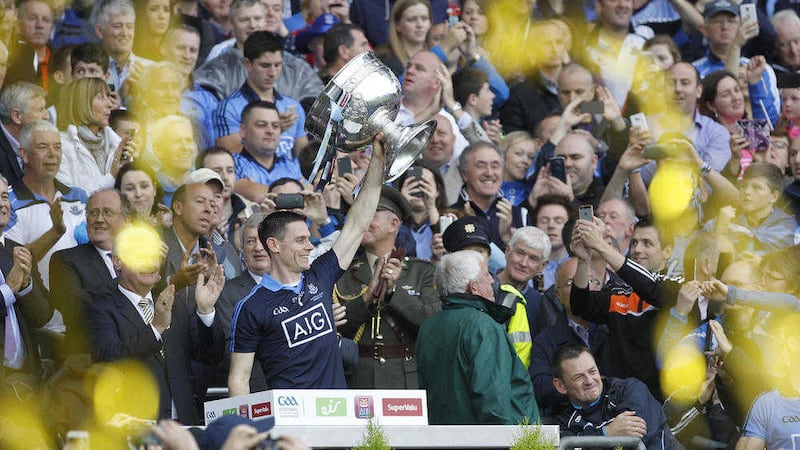NO ONE likes having their time wasted. No one likes having their time taken up unnecessarily.
Those may seem like the same thing and may be equally annoying, but two major sporting events last weekend showed that they’re very different.
Too much time was wasted in the All-Ireland Senior Football final, whereas too much time was taken up in various Rugby World Cup matches. Put more clearly, not enough time was added on in the Gaelic football, too much added in the rugby version.
Everyone accepts you don’t get 70 minutes of action in a Gaelic football game, but far too much time is wasted, particularly in the closing stage if a team is defending a lead. Four-and-a-half minutes of added time were ‘played’ at the end of the second half last Sunday – but the ball was in play for less than a minute of that.
Conversely, rugby matches that are supposed to last 80 minutes and have tended to take up more than 90 minutes in recent years due to stoppages, have come up to around the 100-minute mark at this RWC due to frequent calls on the television match official (TMO).
Getting the time-keeping right has no easy solution.
Rugby is pretty good at time-keeping, with the match clock being stopped at appropriate points during the game, while the action can also continue after the 80 minutes is up as long as the ball is kept alive by the team in possession.
The GAA is not so good. The association flirted with bringing in the hooter to signal the end of each half – well, in fact they did more than flirt, they twice agreed to a date and then cruelly stood up the hooter on both occasions.
Admittedly, although ladies' football has run the hooter system fairly smoothly for several years, the experiment in the 2014 Sigerson Cup didn’t go particularly well, with, astonishingly, no time added on at all in the second half of the final. For various reasons, the GAA didn’t bring the clock/hooter system in for this year’s inter-county competitions, as had been agreed at the 2013 Annual Congress. Taking time-keeping out of the referee’s control would certainly improve matters, though.
Last Sunday’s final felt like a waste of time in more ways than one. Having roused myself from my sickbed to watch the action at Croke Park, feeling worse because I was too ill to be there, I was soon regretting having moved to the sofa and counting my blessings I hadn’t made the trip down to Dublin. There probably aren’t too many people who watched it who wished it had lasted longer – but it should have.
As he did for the decisive free in the 2011 decider against Kerry, Dublin captain and goalkeeper Stephen Cluxton slowly strolled up to take a free kick during the second half. There’s no doubt that, had an outfield player been coming to take that free, the referee would have given him the 'hurry up’, but goalkeepers are allowed to take their time – and everyone else’s.
The solution is simple. Rather than adding on a pile of time, the GAA needs to bring in a ‘30-second rule’, with that being the maximum amount of time between the referee signalling a free is ready to be taken and the ball being struck towards the uprights. Obviously, the referee will have to watch out for opposition players delaying the kick being taken, but once the way is clear, half a minute is more than enough for anyone to compose himself, set his sights and take the blooming kick.
If that forces a goalkeeper to sprint more than half the length of the pitch to take a free, then so be it. It’s obvious teams have sometimes been sending their 'keepers up to take frees or 45s simply to waste time.
During that supposed added time in last Sunday’s final, we had the ‘Will I? Won’t I?’ farce of Cluxton coming up to take a free, then deferring to a colleague, all of which simply ate up more valuable time. Time that was probably added on for time wasted, ironically. If Cluxton had wanted to take that free, he would have taken it – he’s the captain after all.
Let me be clear: even someone with a finger stuck into his eye could see Dublin were the better team, by far, on the day and are the best team in the country. Yet in a tight game, who knows how a goal could have been conjured up in the dramatic closing stages?
As stated, rugby is better at avoiding time-wasting, but perhaps it is now going too far. New Zealand legend Sean Fitzpatrick even suggested that every try should go to the TMO, which would be ridiculous.
The pundits acknowledge that repeated recourse to the TMO can be tedious and referees are perhaps consulting video evidence too much, rather than going to their touch judges/assistant referees. The delays don’t only affect the enjoyment of TV watchers, but those at the games.
As exclusively revealed last week, I’m planning to go to the Ireland-Italy game with friends. Three of us were to travel over to join our tickets-provider/host. Unfortunately, those two other travellers are teachers, who haven’t reached the ‘reading the calendar correctly’ stage of the curriculum (or else refused to do so on their lengthy summer holiday). They didn’t realise the match is on a Sunday evening, meaning they need to be back for work the next morning.
So instead of a night in London or at our hosts’ house, we had to look at flights home on the Sunday night. We found suitable flights from a certain London airport. Sadly that happens to be ‘London Luton. The only upside of it all is that we will spend as little time in Luton as possible. Hopefully.
Our host has to get us from east London to Luton in a squeaky enough timespan, which has already caused one cry-off. Now that’s looking like a greater gamble given how long rugby matches last at this World Cup.
If there are a few controversial incidents during that Ireland-Italy game, several contentious tries, then we may end up seeking beds in Bedfordshire and trying to book new flights.
It's time for rugby refs to take control themselves rather than take up fans’ time, either on TV or at matches.









